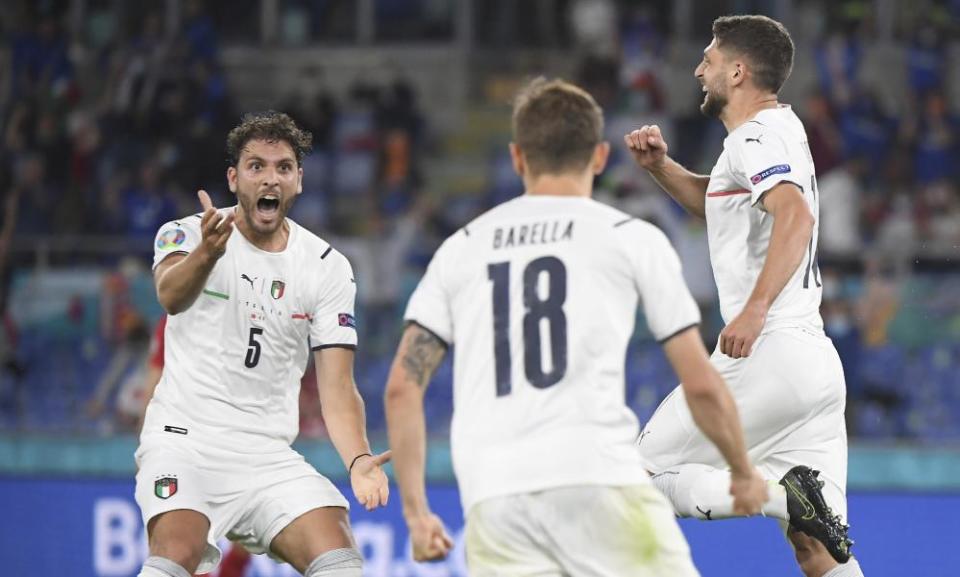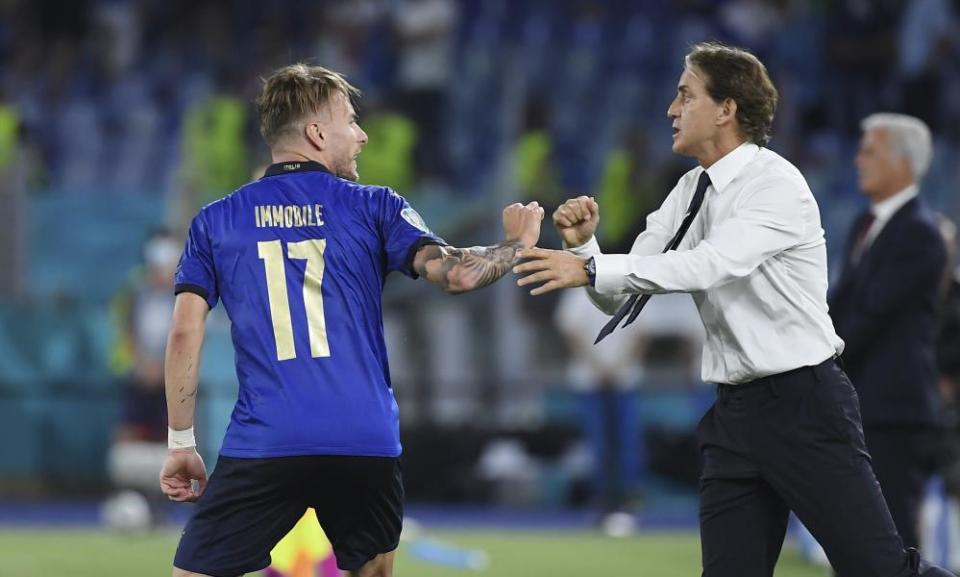Brio of Berardi and Locatelli at the heart of revitalised young Italy

This has already been a record-breaking summer for Roberto Mancini’s Italy. The Azzurri had never scored three goals in a European Championship game before their curtain-raiser against Turkey in Rome. Now they have done it twice in two matches, keeping clean sheets on both occasions.
Ask their players for their magic formula, and you might be disappointed in the reply. “This team has no secret,” insisted the midfielder Nicolò Barella after Wednesday’s demolition of Switzerland. “There’s just enthusiasm, on and off the pitch. This is a compact group.”
Related: Gianluigi Donnarumma joins PSG as Gianluigi Buffon goes back to Parma
Or perhaps that last bit is the secret. In another interview Barella reflected on the fact that he had been playing together with some of his teammates since they were together in Italy’s under-15s.
The bonds within this squad are strong and evident in countless little ways. There is space enough at Italy’s Coverciano training base for every player to have their own room, yet some have still chosen to share – including Ciro Immobile and Andrea Belotti, strikers whose friendship outweighs their rivalry even as they compete for a single spot in the starting XI.
In an open letter on the eve of this tournament, Mancini promised his team would “step on to the pitch with the same carefree attitude you have when you are a kid starting to play football”. It is that spirit, as much as the results themselves, that has captivated: Italy’s determination to enjoy themselves, the will to keep on attacking as enthusiastically at 3-0 as before the first goal goes in.
It is a far cry from the autumn of 2017, when the Azzurri missed out on World Cup qualification under Giampiero Ventura, who refused to send on his most talented forward – Lorenzo Insigne – even when needing a goal to avoid elimination in the play-off second leg against Sweden. Although the manager shouldered the blame, his failure was widely perceived in Italy as part of a bigger picture of national decline.
“This defeat did not come out of nowhere,” said the former Italy manager Arrigo Sacchi at the time. “We arrived here from two disastrous World Cups.”
Italy had failed to make it past the group stage in 2010 and 2014. They did reach the final and quarter-final of European Championships in between, but those were anomalies: two magical summers authored by coaches who captured lightning in a bottle. Cesare Prandelli got the best out of Antonio Cassano and Mario Balotelli. Antonio Conte persuaded Graziano Pellè and Emmanuele Giaccherini they could outperform Romelu Lukaku and Eden Hazard.
Euro 2020 has barely begun but the optimism of this moment is based on more than what can be achieved this summer. A fresh generation is emerging, led not only by Barella but also Manuel Locatelli, whose magnificent goals undid Switzerland on Wednesday, and the goalkeeper Gianluigi Donnarumma.
Some credit might belong to Sacchi, who was appointed as coordinator of Italy’s youth teams in the wake of the 2010 World Cup exit and remained in the role for four years. He said back then that he wanted Italy to be more like Spain, “where the fans won’t applaud if you if you play badly and win”.

If anything, though, the team emerging at Euro 2020 reflect a blend of ideas that are uniquely Italian. Mancini has benefited from the work of his coaching compatriots in Serie A, from Conte – who refined Barella from a marauder who wanted to do everything himself into a precision tool of Inter’s rapid-strike midfield – to Simone Inzaghi, who offered a blueprint for how to get the most from Ciro Immobile.
Improbably, Italy have leaned even more heavily so far on a pair of players from Sassuolo. Locatelli and Domenico Berardi combined for a sensational opening goal against the Swiss that owed much to Roberto De Zerbi, their manager of the past three seasons.
If Mancini asks Italy to play with the carefree attitude of children, then Sassuolo sometimes looked like kids on a sugar high, careering forward with reckless abandon. Before leaving to join Shakhtar Donetsk this summer, De Zerbi gave an interview scorning the idea of defensive “balance”, asking why equilibrium cannot be achieved just as well by creating lots of chances and giving a few up at the other end.
Related: How to support our sports coverage (without asking a billionaire) | Jonathan Liew
His stubborn insistence on playing out from the back led to the concession of many unnecessary goals. Yet Locatelli blossomed, rebounding from the disappointment of being cast aside by Milan aged 20 to finish this most recent campaign as the player who made the most passes per game in all of Serie A. Berardi scored 17 goals from the right wing, having only reached double figures for the first time in the previous term.
Sassuolo are the extreme example of a shifting national culture. Anyone surprised to see an Italian team that prefer attack as the best form of defence at these Euros cannot have been paying close attention to Serie A, which had the highest goals-per-game average among Europe’s top five leagues in 2020-21.
Mancini has his own blueprint. Many of Italy’s core principles – a desire to press high and dictate the tempo – are evolutions of what we have seen from his teams in the past, at Inter and Manchester City. Yet he has embraced the moment as well, adapting his system to the strengths of players thriving at club level.
His common refrain of the past fortnight has been that there are no starters in his squad, only rules that restrict him to 11 on the pitch at one time. He is likely to try some different options against Wales on Sunday, with qualification to the last 16 already secure.
Marco Verratti is expected to feature, after missing the first two games with a knee injury. “Whoever plays will do well,” insists Barella. Italy’s kids are not done having fun.

 Yahoo Sport
Yahoo Sport 





































